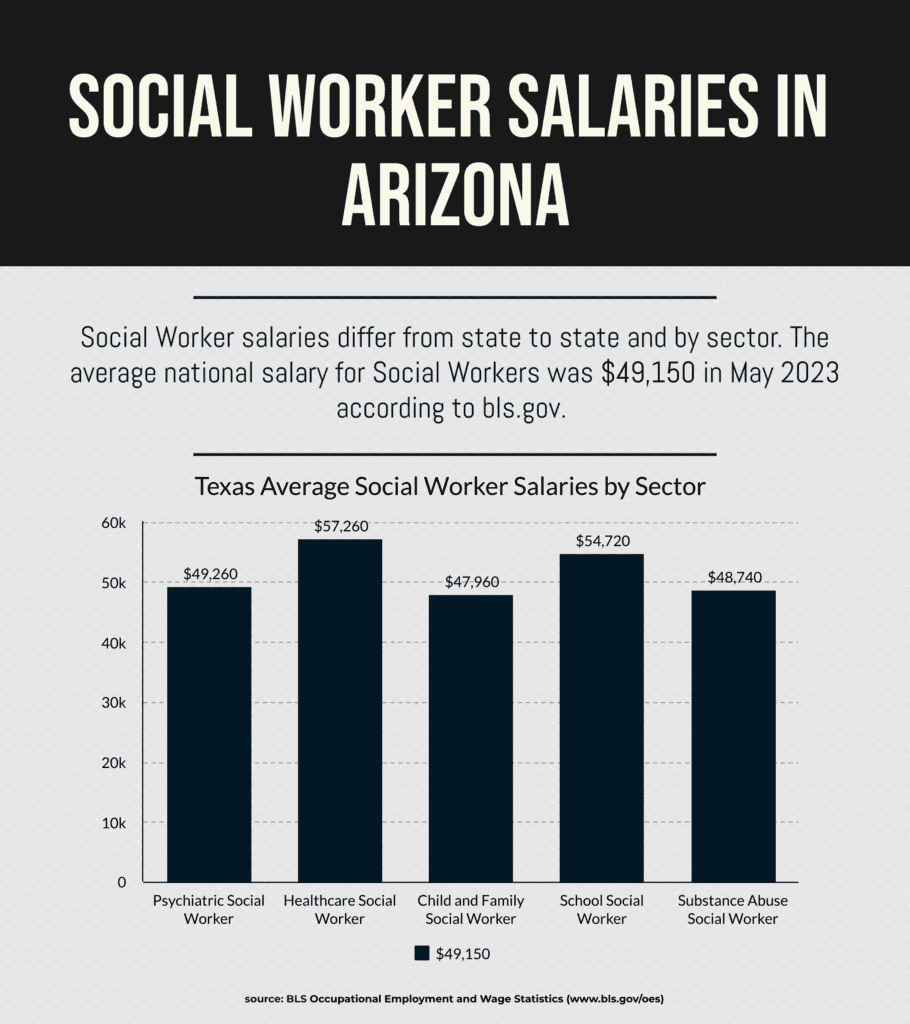
Our guide on how to become a Social Worker in Arizona explains the education, license, and employment information for a career the state.
Arizona, also known as the Grand Canyon State, is located in the southwestern region of the United States. It covers an area of approximately 113,990 square miles and is the 6th largest state in the country. Arizona is known for its sun-soaked desert landscapes, iconic red rock formations, and diverse wildlife.
The state has a population of around 7.4 million people, making it the 14th most populous state in the US. The capital city is Phoenix, and serves as the economic and cultural hub of the state.
Arizona has a flourishing economy driven by various sectors such as tourism, mining, agriculture, technology, and aerospace. The warm climate and natural attractions include the Grand Canyon, Sedona, and also Monument Valley. So it is a popular destination for tourists from across the globe. Additionally, Arizona has a strong higher education system, with notable institutions like the University of Arizona and Arizona State University.
Culturally, Arizona is rich and diverse. It has a significant Native American population and a mix of Hispanic, Anglo-American, and other ethnic communities. The state showcases a fusion of different traditions, including Native American heritage, Mexican influences, and Western cowboy culture.
What Are the Social Work Education Requirements in Arizona?
To become a licensed social worker in Arizona, you need to meet certain educational requirements. Typically, these requirements include:
Associate in Social Work (AA or AS)
An Associate in Social Work is an entry-level academic degree program. It provides foundational knowledge and skills in the field of social work. Graduates of this program can work in various settings, supporting individuals and communities in need, under the supervision of licensed social workers.
Bachelor’s Degree In Social Work
A Bachelor’s Degree in Social Work is a four-year undergraduate program. It equips students with the knowledge, skills, and values necessary to pursue a career in the field of social work. It covers various topics including human behavior, social justice, diversity, counseling techniques, policy analysis, and community engagement. Graduates can work in social service agencies, healthcare systems, government organizations, or pursue advanced studies in social work.
Master’s Degree In Social Work
A Master of Social Work (MSW) is an advanced master’s degree in social work required for advanced positions and for clinical practice. The MSW program must also be accredited by the CSWE.
Doctoral Degrees in Social Work
A Doctoral Degree in Social Work is the highest level of academic achievement in the field of social work. It involves advanced coursework, research, and a dissertation. Graduates of this program are prepared for leadership roles in academia, research, policy development, or advanced clinical practice.
Field Experience
Both BSW and MSW programs require field experience or internships. These experiences give students practical hands-on experience in a social work setting. This allows them to apply the knowledge obtained in the classroom to real-world situations.
Licensure
After completing the necessary education, you’ll need to obtain a license to practice social work in Arizona. This typically involves passing the Association of Social Work Boards (ASWB) licensing exam. There are different categories of social work licensure, including Licensed Baccalaureate Social Worker (LBSW), Licensed Master Social. There could be a renewal fee down the road.
CSWE Accreditation
In Arizona, CSWE accreditation ensures that programs meet the established standards in curriculum, faculty qualifications, student support, and also field education. So thereby ensuring quality education and preparation for aspiring clinical social workers.
What Are the Social Work Licensing Requirements in Arizona?
Social work licensing requirements in Arizona involve obtaining a degree in social work from a CSWE-accredited program. Prospective social workers must also complete at least two years or 3,200 hours of supervised experience. Then they must pass the national ASWB exam, and submitting an application for licensure to the Arizona Board of Behavioral Health Examiners.
Licensed Bachelor Social Worker (LBSW)
A Licensed Bachelor Social Worker (LBSW) is a professional who has obtained a bachelor’s degree in social work and holds a license to practice social work. A licensed baccalaureate social worker lbsw is qualified to provide social services, assess clients’ needs, develop treatment plans, and offer counseling and support to individuals, families, and communities.
Licensed Master Social Worker (LMSW)
A Licensed Graduate Social Worker (LMSW) is a professional who has completed the necessary education and clinical supervision requirements to obtain a license to practice social work at the graduate level. A licensed master social worker LMSW is qualified to provide therapeutic and supportive services to individuals, families, and communities under the supervision of a licensed clinical social worker or other mental health professional.
Licensed Clinical Social Worker (LCSW)
A Licensed Clinical Social Worker (LCSW) is a professional social worker who has obtained a master’s or doctoral degree in social work, completed clinical supervised practice hours, and passed a licensure exam. A Licensed clinical social worker LCSW is trained to provide therapeutic interventions, diagnose mental health disorders, and offer independent clinical services to individuals, families, and groups.
Can You Get A Social Work License by Endorsement In Arizona?
To obtain a social work license by endorsement in Arizona, you must meet the following requirements:
- Hold a current and active social work license in good standing from another state or jurisdiction.
- Submit an application for licensure by endorsement to the Arizona Board.
- Provide verification of your current license and any disciplinary actions taken against your license in the previous state or jurisdiction.
- Meet any additional requirements determined by the Arizona Board, which may include additional coursework, passing an Arizona-specific exam, or fulfilling supervision requirements.
It is important to note that licensing requirements can change, and it is recommended to contact the Arizona Board directly for the most accurate and up-to-date information regarding licensure by endorsement.
What are the Steps To Become A Social Worker In Arizona?
To become a licensed clinical social worker LCSW in this state, the process typically involves the following steps:
- Earn a bachelor’s degree or master’s degree in social work from a program accredited by the Council on Social Work Education (CSWE). This typically takes four years of full-time study.
- Gain relevant work experience through internships, field placements, or volunteer work to build practical skills and gain exposure to the field of social work.
- Apply to the Arizona Board of Behavioral Health Examiners for licensure as a Licensed Bachelor Social Worker (LBSW) or a Licensed Master Social Worker (LMSW). This includes submitting an application, providing documentation of education and experience, and paying the required fees.
- Pass the appropriate social work licensing exam administered by the Association of Social Work Boards (ASWB) before you can have direct client contact. The specific exam will depend on the level of licensure you are seeking (LBSW or LMSW).
How Long Does It Take To Become A Social Worker In Arizona?
The exact timeframe can vary depending on factors such as the length of your education, the time it takes to gain relevant experience, and the processing time for licensure applications. Generally, it can take around four to six years or longer to complete the education and licensing requirements.
Arizona social work license is attainable thru various featured online programs and featured programs in person. Before gaining the ability to have direct client interaction, you can get a temporary license and complete your professional development thru direct supervision with a advanced generalist, complete your clinical exam, complete community services, practice clinical social work with a advanced generalist. This will prepare you for direct client contact.
How Much Do Social Workers Make In Arizona?
According to the US Bureau of Labor Statistics (BLS), the median annual wage for clinical social workers in Arizona was $45,420. The lowest 10 percent earned less than $35,590, and the highest 10 percent earned more than $61,960. These figures can vary based on factors such as experience, qualifications, and location within the state.
Family Social Workers
Family Social Workers are trained professional who provides therapy, counseling, and support services to individuals and families dealing with mental health issues, helping them to cope, manage their symptoms, and improve their overall quality of life.
School Social Workers
School social workers offer support to students and their families, providing counseling, intervention, and referrals to community resources to address academic, social, and emotional challenges in a school setting as a school social worker.

Please note that these salaries are just average estimates and can vary based on factors such as experience, education level, and location within Arizona.
Their dedication to improving peoples’ well-being and success is invaluable. Social workers in other settings, such as healthcare or child welfare, play a crucial role in advocating for the vulnerable, providing services, and facilitating access to resources. Their compassion, empathy, and tireless efforts make a significant impact in the lives of individuals and communities. We greatly appreciate the commitment of social workers in creating a better and more inclusive world for everyone.
Overall, working in this field is a demanding but fulfilling career. It requires empathy, resilience, and a strong dedication to helping others. Social workers have the opportunity to make a positive impact on individuals, families, and communities, improving their overall well-being and quality of life. However, it also comes with its fair share of challenges, such as heavy caseloads, bureaucratic barriers, and a sometimes overwhelming emotional toll. Despite these challenges, the reward of seeing positive change in the lives of those they work with makes it all worthwhile. Social workers offer the opportunity to truly make a difference in the world and contribute to the greater good.
Related:
BILINGUAL SOCIAL WORKER JOBS AND HOW TO GET ONE IN THE UNITED STATES

